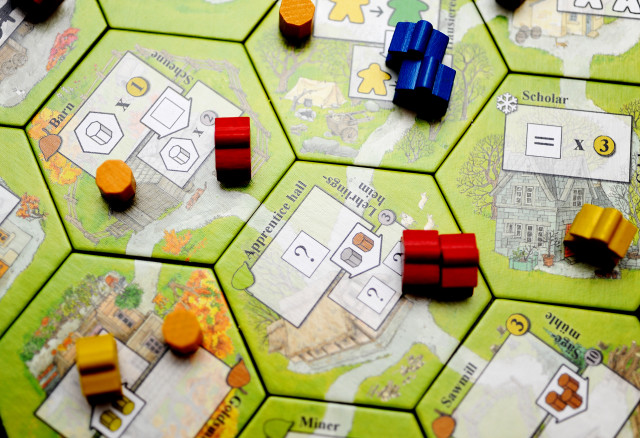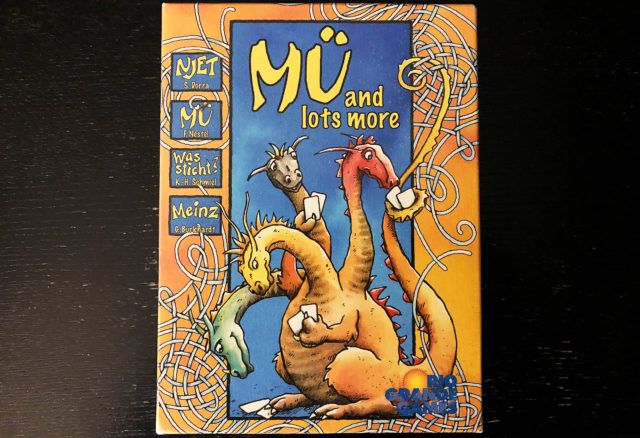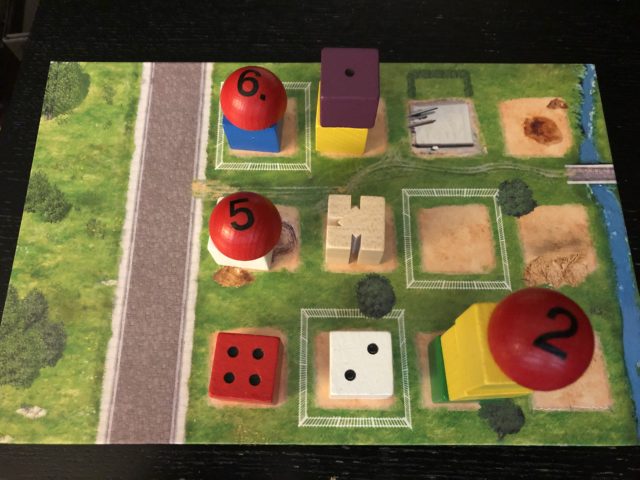Games that center on bidding and auction are possibly the hardest ones to master, because they rely on your ability to evaluate the worth of something at the same time as your opponents are doing the same. That sometimes means bluffing and pushing your luck, hoping to get someone to pay more for something than you think it’s actually worth, risking having to pay for it yourself. In other words, you have to be good both at mathing and psychology. That’s not an easy combo. Which is one reason why we have only recently created an AI capable winning Texas Hold’em against the best human players.

One problem with bidding games is that they are almost always better with more players. There are almost no two-player bidding games. Of the ones that exist, the only good ones I know about are Medici vs Strozzi, Biblios, and Keyflower. The other problem is that they are fragile: a player can derail the game if they aren’t paying attention to what’s going on–or worse, don’t care. Not all bidding games have mechanisms to correct for sub-optimal behaviour.
On the plus side, bidding games tend not to be rules-heavy. Their depth and challenge comes from the calculation you have to do to anticipate everyone else’s moves.
Originally my list was five games long, but there were two games I just couldn’t leave off or else I would feel I was doing them–and the bidding genre–a disservice.

For Sale: I put this game on a pedestal back in 2018 and you can read about it in depth there. Suffice to say that I can’t think of a better introductory bidding game that is playable by kids as young as eight. Simple, elegant, fast, portable, endlessly replayable.
QE is the newest game on this list and is a fascinating take on another old classic, High Society. Players are bidding on companies trying to complete sets of both similar and different industries and countries. However, at the end of the game the player who has spent the most money is eliminated. The final exquisite twist is that players are blind-bidding by writing their bids with erasable marker on their boards; only the auctioneer of that round sees the bids. So there is literally no limit on how high you can go. Bit by bit you get a sense of how much the other players are spending. Some games remain sane; others end up in hilarious hyperinflationary spirals. Love it.

Modern Art is the first of two on this list by The Good Doctor, Reiner Knizia, who is arguably the master of bidding games–no surprise perhaps as he has a PhD in Mathematics. I wrote about this one as well when its latest edition came out with all-original art. What I love about Modern Art is that it works as a kind seminar on bidding techniques, since there are four different kinds of auction in the game: blind bidding; once-around; free-for-all; and reserve-price. You cannot win this game by buying your own paintings!
Bridge. I mean, to some there are no other bidding games. I have many fond memories of playing this at university in residence. The fact that each of Bridge’s two distinct yet related phases has such rich strategic and tactical depth is astounding. You not only have to skillfully maneuver with your partner in the first phase without seeing anyone else’s cards but your own, but you have to either achieve your bid or try to foil the opposing team’s bid in the second half. Although I believe Bridge has been improved upon (see immediately below), there is no question it belongs at or near the top of any list.

Mü is Bridge on steroids. Like Bridge, each round consists of a bidding phase followed by a trick-taking phase, and players race to reach a certain threshold of points. But almost everything else is twisted and different, starting with the fact that it can be played by four, five, or six players–and in fact is best with five. Then there’s the deck, which consists of five suits numbered zero through nine with two 1’s and two 7’s. Bidding is done by selecting and playing cards, so the higher you bid, the more everyone knows about your hand. Instead of permanent two-player partnerships, the winning bidder picks a partner from among the other players–so even if you don’t have a strong hand yourself you need to bid to signal the other players how you could conceivably help to reach (or foil) the upcoming contract. Either suits or individual values can be trump, and in fact usually there are two trumps, with the “higher” one taking precedence. The scoring system is similarly twisted.
I can’t do Mü full justice here; there is an iOS app that can help you develop your skills against solid AI, and in fact I’ve only ever played it ftf once. But if there were any justice in this world, it would be as popular as Bridge–or at least Euchre.

Ra is one of Reiner Knizia’s best games, period. Over three eras, players take turns either drawing a tile from a bag and adding it to the current auction lot, or calling “Ra” and initiating an auction. Sometimes tiles force an auction; others actually destroy tiles if you are forced to take them when you win an auction. Each category of tiles scores differently–most at the end of each Era, but one type (monuments) only at the end of the game. Some tiles disappear after scoring, others stick around. The currency of the game is sun tokens, uniquely numbered from one to thirteen or sixteen depending on how many are playing. The “1” token starts the game on the board. Whoever wins the first auction takes it along with the tiles they won, replacing it with the tile they used to bid, and turns it face down, unusable until the next Era. That means no player is going to win more than three (or four) auctions per Era; once you use your face-up suns, you’re done, son. Each Era ends after a certain number of tile-driven auctions. If you still have unused suns left over, too baaaad.
Ra is a game of push your luck, bluff, intimidation, and general mind-friggery. It’s also quite easy to teach and learn, which makes it a great gateway game. But it still ain’t the best bidding game in my mind. That would have to be…

The Estates. You and up to four others are real-estate developers looking to reap the most financial gain from the local town council’s decision to expand from the local highway out to the river and perhaps beyond. On your turn you will put something up for auction: a building, a roof, a permit, or even the Mayor. Whoever wins the auction gets to decide what to do with it–and you get the money. So, as in Modern Art, you almost never want to win your own auctions.
Ultimately, though, only roofed buildings on two of the town’s three streets will score for their owners. The more of those you own, the better. Unfortunately, you will also probably own buildings that don’t get finished and don’t score, which will subtract from your total.
I love the way the game encourages temporary alliances and reward players who keep an eye on the overall game-state. For instance, you and an opponent may both own buildings on the same street–in which case it’s in both your interests to make sure that street scores. But another player, who doesn’t stand to gain from that street scoring, could (and should) put a permit up for sale that lengthens that street, effectively converting it instantly from “finished and ready to score” to “unfinished and oh shit”. Either you or your “ally” should bid on that auction to toss that permit away–but who’s going to spend the money?
When played with a full complement of on-the-ball players, The Estates is a roller-coaster with twists and turns as first one and then another player is screwed over tries to claw their way back into the running. You can even play it as a mini-campaign with money and scores carrying over from game to game, which is something I’d love to try if I can convince the right people.
* * *
I hope at least one of these games is new to you and now on your radar. What game do you think I left off this list unjustly?
Capitol. Medici.
Just stupid
Do you have the BGG link to Just Stupid? I can’t find it anywhere